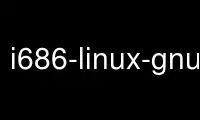
This is the command i686-linux-gnu-strings that can be run in the OnWorks free hosting provider using one of our multiple free online workstations such as Ubuntu Online, Fedora Online, Windows online emulator or MAC OS online emulator
PROGRAM:
NAME
strings - print the strings of printable characters in files.
SYNOPSIS
strings [-afovV] [-min-len]
[-n min-len] [--bytes=min-len]
[-t radix] [--radix=radix]
[-e encoding] [--encoding=encoding]
[-] [--all] [--print-file-name]
[-T bfdname] [--target=bfdname]
[-w] [--include-all-whitespace]
[-s] [--output-separatorsep_string]
[--help] [--version] file...
DESCRIPTION
For each file given, GNU strings prints the printable character
sequences that are at least 4 characters long (or the number given with
the options below) and are followed by an unprintable character.
Depending upon how the strings program was configured it will default
to either displaying all the printable sequences that it can find in
each file, or only those sequences that are in loadable, initialized
data sections. If the file type in unrecognizable, or if strings is
reading from stdin then it will always display all of the printable
sequences that it can find.
For backwards compatibility any file that occurs after a command line
option of just - will also be scanned in full, regardless of the
presence of any -d option.
strings is mainly useful for determining the contents of non-text
files.
OPTIONS
-a
--all
- Scan the whole file, regardless of what sections it contains or
whether those sections are loaded or initialized. Normally this is
the default behaviour, but strings can be configured so that the -d
is the default instead.
The - option is position dependent and forces strings to perform
full scans of any file that is mentioned after the - on the command
line, even if the -d option has been specified.
-d
--data
Only print strings from initialized, loaded data sections in the
file. This may reduce the amount of garbage in the output, but it
also exposes the strings program to any security flaws that may be
present in the BFD library used to scan and load sections. Strings
can be configured so that this option is the default behaviour. In
such cases the -a option can be used to avoid using the BFD library
and instead just print all of the strings found in the file.
-f
--print-file-name
Print the name of the file before each string.
--help
Print a summary of the program usage on the standard output and
exit.
-min-len
-n min-len
--bytes=min-len
Print sequences of characters that are at least min-len characters
long, instead of the default 4.
-o Like -t o. Some other versions of strings have -o act like -t d
instead. Since we can not be compatible with both ways, we simply
chose one.
-t radix
--radix=radix
Print the offset within the file before each string. The single
character argument specifies the radix of the offset---o for octal,
x for hexadecimal, or d for decimal.
-e encoding
--encoding=encoding
Select the character encoding of the strings that are to be found.
Possible values for encoding are: s = single-7-bit-byte characters
(ASCII, ISO 8859, etc., default), S = single-8-bit-byte characters,
b = 16-bit bigendian, l = 16-bit littleendian, B = 32-bit
bigendian, L = 32-bit littleendian. Useful for finding wide
character strings. (l and b apply to, for example, Unicode
UTF-16/UCS-2 encodings).
-T bfdname
--target=bfdname
Specify an object code format other than your system's default
format.
-v
-V
--version
Print the program version number on the standard output and exit.
-w
--include-all-whitespace
By default tab and space characters are included in the strings
that are displayed, but other whitespace characters, such a
newlines and carriage returns, are not. The -w option changes this
so that all whitespace characters are considered to be part of a
string.
-s
--output-separator
By default, output strings are delimited by a new-line. This option
allows you to supply any string to be used as the output record
separator. Useful with --include-all-whitespace where strings may
contain new-lines internally.
@file
Read command-line options from file. The options read are inserted
in place of the original @file option. If file does not exist, or
cannot be read, then the option will be treated literally, and not
removed.
Options in file are separated by whitespace. A whitespace
character may be included in an option by surrounding the entire
option in either single or double quotes. Any character (including
a backslash) may be included by prefixing the character to be
included with a backslash. The file may itself contain additional
@file options; any such options will be processed recursively.
Use i686-linux-gnu-strings online using onworks.net services
